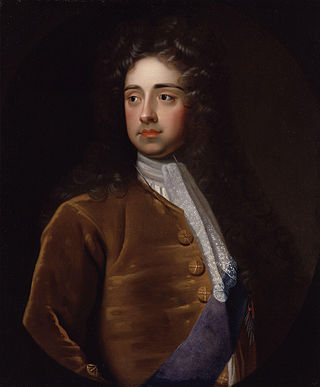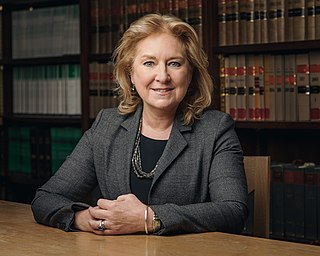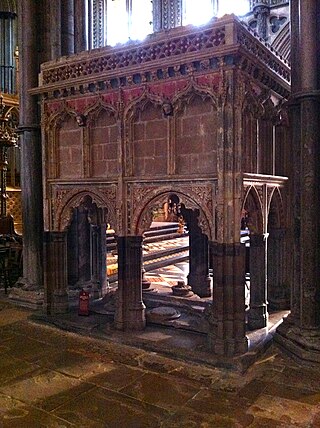Contents
This article needs additional citations for verification .(February 2024) |
| |||||
| Centuries: | |||||
|---|---|---|---|---|---|
| Decades: | |||||
| See also: | Other events of 1321 List of years in Ireland | ||||
Events from the year 1321 in Ireland.
This article needs additional citations for verification .(February 2024) |
| |||||
| Centuries: | |||||
|---|---|---|---|---|---|
| Decades: | |||||
| See also: | Other events of 1321 List of years in Ireland | ||||
Events from the year 1321 in Ireland.

The chancellor of the exchequer, often abbreviated to chancellor, is a senior minister of the Crown within the Government of the United Kingdom, and head of Treasury. As one of the four Great Offices of State, the chancellor is a high-ranking member of the British Cabinet.

The Lord Chancellor, formally titled Lord High Chancellor of Great Britain, is a senior minister of the Crown within the Government of the United Kingdom. The lord chancellor is the minister of justice for England and Wales and the highest-ranking Great Officer of State in Scotland and England, nominally outranking the prime minister. The lord chancellor is appointed and dismissed by the sovereign on the advice of the prime minister. Prior to the union of England and Scotland into the Kingdom of Great Britain, there were separate lord chancellors for the Kingdom of England and the Kingdom of Scotland. Likewise, the Lordship of Ireland and its successor states maintained the office of lord chancellor of Ireland until the establishment of the Irish Free State in 1922, whereupon the office was abolished.

The Lord High Treasurer was an English government position and has been a British government position since the Acts of Union of 1707. A holder of the post would be the third-highest-ranked Great Officer of State in England, below the Lord High Steward and the Lord High Chancellor of Great Britain.

The Lord or Lady Chief Justice of England and Wales is the head of the judiciary of England and Wales and the president of the courts of England and Wales.
The Lord High Chancellor of Ireland was the highest judicial office in Ireland until the establishment of the Irish Free State in 1922. From 1721 to the end of 1800, it was also the highest political office of the Irish Parliament: the Chancellor was Speaker of the Irish House of Lords. The Lord Chancellor was also Lord Keeper of the Great Seal of Ireland. In all three respects, the office mirrored the Lord High Chancellor of Great Britain.
Edmund, Earl of Rutland was the fourth child and second surviving son of Richard Plantagenet, 3rd Duke of York, and Cecily Neville. He was a younger brother of Edward, Earl of March, the future King Edward IV who came to the throne in 1461, the year after Edmund's death. He was born in Rouen, then the capital of English-occupied France and his father held the office of Lieutenant of France. He was killed at the age of 17 either during or shortly after the Battle of Wakefield, during the Wars of the Roses.

After campaigning against the foreign policy of the Beaconsfield ministry, William Gladstone led the Liberal Party to victory in the 1880 general election. The nominal leader of the Party, Lord Hartington, resigned in Gladstone's favour and Gladstone was appointed Prime Minister of the United Kingdom for a second time by Queen Victoria. He pursued a policy of parliamentary reform, but his government became wildly unpopular after the death of General Gordon in 1885. Gladstone was held responsible, and resigned, leaving the way free for the Conservatives under Lord Salisbury to form a government.
Events from the year 1308 in Ireland.

The Court of Chancery was a court which exercised equitable jurisdiction in Ireland until its abolition as part of the reform of the court system in 1877. It was the court in which the Lord Chancellor of Ireland presided. Its final sitting place was at the Four Courts in Dublin, which still stands.
Events from the year 1513 in Ireland.
Events from the year 1385 in Ireland.

John Hotham was a medieval Chancellor of the Exchequer, Lord High Treasurer, Lord Chancellor and Bishop of Ely. He was also the effective Governor of Ireland for a time.

Justices of the Supreme Court of the United Kingdom are the judges of the Supreme Court of the United Kingdom other than the president and the deputy president of the court. The Supreme Court is the highest court of the United Kingdom for all civil cases, and for criminal cases from the jurisdictions of England and Wales and Northern Ireland. Judges are appointed by the British monarch on the advice of the prime minister, who receives recommendations from a selection commission.
Events from the year 1687 in Ireland.
Events from the year 1377 in Ireland.
Events from the year 1245 in Ireland.
Events from the year 1237 in Ireland.
Events from the year 1313 in Ireland.
Events from the year 1388 in Ireland.
Events from the year 1423 in Ireland.